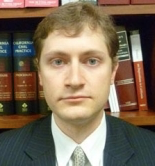Industry Insights
September 14, 2021
Grinberg: Subsidizing Rent Sufficient to Establish Partial Dependency
- State: California
- - 0 shares
We are more than a month away from Halloween, but that doesn’t stop store displays from going all out on spooky decorations, candy and costumes. In that same spirit, I offer a rather grim panel opinion having to do, of course, with the spookiest of aspect to our beloved swamp of California workers’ compensation: the Death Without Dependents unit.

Gregory Grinberg
The basic gist of this unit is that when there is an industrial death and the worker dies without any dependents, the state comes in to collect the death benefit. In most cases, the defendant is searching high and low for at least one partial dependent to avoid having to pay the max benefit, although it appears that the logic is inverted for COVID-19-related death cases, as Senate Bill 1159 and Gov. Gavin Newsom’s executive order appear to bar the Division of Workers' Compensation recovery in those cases.
The panel decision under the microscope today is that of Tara O’Sullivan v. City of Sacramento. In this instance, the DWD and an alleged partial dependant were at odds about whether the latter qualified as a partial dependent at all.
The deceased was a City of Sacramento police officer who was shot and killed in the line of duty in 2019. As the judge recounted, “[j]ust prior to her death, decedent and [applicant-dependent] agreed to move in together with [the latter’s] fiancé. This would allow [applicant-dependent] to save money for her planned wedding.” The decedent agreed to pay half (not one-third) of utilities.
The judge acknowledged that a mere roommate scenario would not give rise to a dependency relationship. However, in this case, the decedent was paying half of the utilities while representing only one-third of the occupants of the home. The judge reasoned that “[decedent] agreed, in effect, to subsidize applicant’s rent and utilities.”
The Workers' Compensation Appeals Board denied the DWD’s petition for reconsideration.
So, some takeaways from this decision: Dependency does not require any large sums of money. The standard for a partial dependent can be some level of support, even so little as subsidizing rent and utilities.
But contrast that with the WCAB’s opinion in the case of Guadalupe Ayon (Deceased), wherein the board held that a deceased worker must have contributed more to the household than his or her own expenses. There, the defendant argued that the surviving family members were benefiting from the economies of scale that they could no longer rely upon.
Gregory Grinberg is managing partner of Gale, Sutow & Associates’ S.F. Bay South office and a certified specialist in workers’ compensation law. This post is reprinted with permission from Grinberg’s WCDefenseCA blog.
Advertisements
Columns
- Langham: Not Always an Accident 01/07/26
- Barthel: Is SIBTF a Great Idea Gone Awry? 01/05/26
- CAAA: New Comp Laws Take Effect in 2026 12/31/25
- Opalisky: The Ongoing War Over State's Statutory Employer Doctrine 12/30/25
- Kamin: Our Top 10 Blogs of 2025 12/26/25
- Barthel: Are You an Employer, or Do You Use Independent Contractors? Can You Prove It? 12/24/25
- Barthel: Is Pot a Defense? Are You High? 12/22/25
- Barthel: Is Dubon II on the Way Out? 12/17/25
- Montgomery: San Fran City Official Stole $627k From Workers' Comp Division 12/10/25
- Kamin: Ring the Bells for Settlement Season 12/08/25
- Paduda: Does Comp Care About Workers? 12/05/25
- Sandoval: Throwing Subrogation Under the Bus 12/03/25
- Johnson: Some Thoughts on Apportionment - And SIBTF 11/20/25
- Montgomery: State's First Responders May File Comp Claims for Trauma 11/14/25
- Snyder: Use This New Survey to Negotiate Better 11/12/25
- Holden: Workers' Compensation Act Withstands Another Constitutional Attack 11/11/25
- Gelman: Sherrill's Win Locks in Worker Protections 11/10/25
- Kamin: Newsom Promises SIBTF Reforms in 2026 11/07/25
- Kamin: Comp Costs Hit Highest Combined Ratio Since 2001, WCIRB Says 11/05/25
- Montgomery: DIR to Blow $1.25M on Another Questionable Comp Study 11/03/25
Now Trending
- Workers' Compensation News
-
Calif. Orange
County Judge Pleads Guilty to
Defrauding…
Posted on Jan 8, 2026
-
Calif. Former SF
Official Sentenced to Three Years
for Fraud…
Posted on Jan 6, 2026
-
Calif. Carrier
Loses Claims Against Counsel for
Widow Who Fraudulently Sought…
Posted on Jan 5, 2026
-
Calif. OAL
Approves Utilization Review…
Posted on Jan 2, 2026
-
Calif. Charged
Rates Stabilize, No Hike Following
Advisory Rate…
Posted on Jan 2, 2026
-
Colo. Corporate
Officer Not Subject to Statutory
Cap on Damages for Work-Related…
Posted on Jan 7, 2026
-
Idaho Supreme
Court Denies Worker's Claim for
Herniated Nucleus…
Posted on Jan 6, 2026
-
Pa. Missed Filing
Deadline by 1 Day Costs Worker His…
Posted on Jan 2, 2026
-
Mich. Employers
Defending Against Comp Claims Can
Get Workers' Confidential…
Posted on Jan 2, 2026
-
La. Auto Insurance
Provider Owes No Coverage to
Insured's Injured…
Posted on Jan 5, 2026
Jobs
- Defense WC Attorney Wanted- We will beat any offer for the right candidate. Low billables, real bonuses and fast track equity partnership
- Workers' Compensation Examiner
- JC-501284 Workers’ Compensation Judge
- Legal Secretary
- Attorney for Northern California
- Attorney for Southern California
- Paralegal for Southern California Workers' Compensation Jobs
Upcoming Events
Jan 15, 2026
Webinar: Psychosocial Factors
Discover how psychosocial factors impact recovery outcomes in injured workers during WCRI’s 30-min …
Jan 22, 2026
Outlook 2026: What’s Ahead for
WorkCompCentral is hosting a 120-minute, CA MCLE–accredited live webinar on January 22, 2026 (time …
Mar 3-4, 2026
Save The Date! WCRI’s 2026 Ann
Registration will open up in the coming months. We'll see you there! - Leading national workers' …
Social Media Links
c/o Business Insurance Holdings, Inc.
Greenwich, CT 06836




No Comments
Log in to post a comment